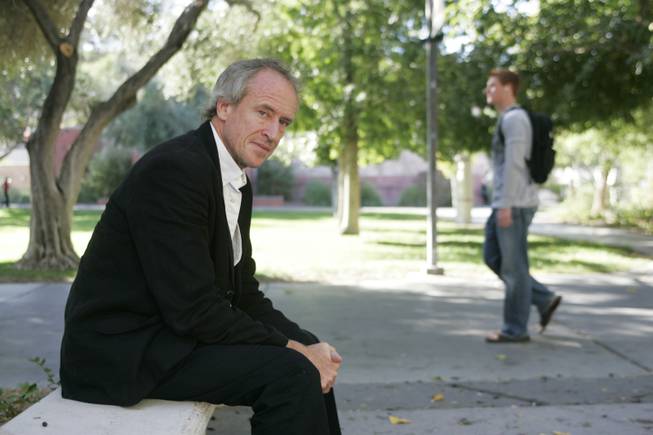Friday, Oct. 23, 2009 | 2 a.m.
Timothy O’Grady is a freelance journalist and the author of six books. He left America at 22 and has lived the past 35 years or so in Ireland, Britain, Spain and Poland. His latest book, “Divine Magnetic Lands,” is 15,000-mile travelogue of his reacquainting himself with America and will be published in the U.S. next month by Trafalgar Square Books. He is a Tom and Mary Gallagher Fellow at UNLV’s Black Mountain Institute.
How did you come to Las Vegas?
There was an ad in the New York Review of Books. I was kind of itching to get back to the West, and there would be access to a library and a faculty of experts whom I could bother.
I never thought I would be in Las Vegas. I find casinos so repulsive. They look like morgues for the half dead. I don’t like the light or the décor, or the pallor of the people, the look of absolute desperation and the lifeblood just draining out of them as they sit at these machines.
But then someone told me I wouldn’t actually have to go to casinos.
Outside of the casinos, how do you like it?
In Europe, everything is very stitched in, but here there’s this feeling that you can make your life how you like it. And there’s this fantastic landscape, a sort of collective unconsciousness of the West that’s lying out on the edge of the city and expanding out and out.
People here are much more responsive to you. In Europe, they’re very suspicious of you at first, but here, out West, they actually wish you well.
I know there seems to be kind of a code, a rule where people say they despise Las Vegas, but in this city of vice, the secret vice is that they love living in Las Vegas and couldn’t imagine living anywhere else.
Why did you decide to revisit the United States?
I really missed the open road. It’s allegorical and it’s anonymous and it’s boundless possibility. There are all of those little towns with the blue light of a bar spilling out onto the road, and I missed that. Some great books have been written about the road, but I figured that just by the accident of my birth and circumstances that I would have a perspective and maybe a book.
What did you find?
The little bars of small-town America are of great value for stories.
In Wallace, Idaho, there was this wild savage man, just fantastically drunk, roaring that he wanted to go out and kill Mexicans. He came right up in my face, with this heavy bourbon breath, and started telling me about how he was a veteran and how many confirmed kills he had in Vietnam. He brought out a picture of his daughter sitting on a tank in Iraq. His wife had been in the military as well, and they had both asked her not to enlist. He didn’t want her to go around with all the garbage in her head that he has. People do say things to strangers, you know.
You’ve said that when you were overseas, you saw something catastrophic happening in America. Why do you say that?
There was a sense of inflation, whether it was executive salaries, grade inflation or foreign policy, and for a long time people had the resources, many of them borrowed, to live this fiction for a while, but not forever.
There’s sort of this template in America that sees everything on an exaggerated, apocalyptic scale, a sense that history is sort of building to biblical convulsions instead of making incremental progress. Even the election of Obama was set up where he was a redeemer and there was a possibility for rebirth. We have hopes, but it was an election.
Well, beyond that ...
It’s economic disproportion, too. In my parents’ world, the American dream was more and more people being drawn into the middle and the disproportion of the people on either end of this scale being manageable.
There wasn’t this Brahman class of people making millions upon millions of dollars and flying in private jets, living in gated communities and sending their kids to private schools while in Detroit there’s abandoned houses and trees growing up in the middle of town and wildlife roaming the streets. It’s a breakdown of proportion. It’s all out of scale and somebody is going to have to pay for it someday.


Join the Discussion:
Check this out for a full explanation of our conversion to the LiveFyre commenting system and instructions on how to sign up for an account.
Full comments policy